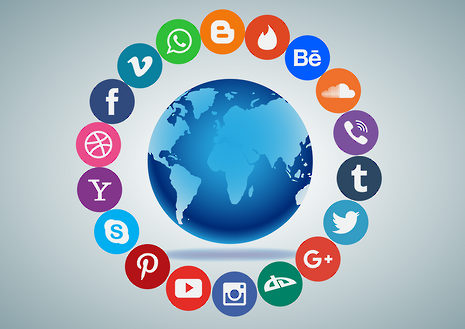The age of the ‘Influencers’
Reflecting on the evolution of social media, Michael Reiners examines the pitfalls of the new breed of online pseudo-celebrities

In the year 2008 it was de rigueur for a twelve year old to have an image of Bart Simpson as their Facebook profile picture. A man could sit back, cross his legs and know he had made it - he was online, and Bart Simpson was his ambassador. Today, this would be unthinkable, likely deemed the result of a ransomware attack, or an outrageous act of self-sabotage.
Just when did social media go from being a novelty, barely tethered to us, to an extension of our very sense of self?
“It is easy to lose sight of your offline self when the façade proves to be infinitely more socially successful”
It first became apparent when going ‘without it’ began being treated as some kind of radical statement. “I Forgot My Phone”, a video released in 2013 was one of the first to popularly suggest this. It portrayed a young woman living a phoneless existence in contrast to her fellow millennials, all of whom had been rendered incapable of conversation by portable technology. Without a trace of irony, “I Forgot My Phone” promptly went viral, and over the passing five years there have been countless platitudinous videos like it. With them came plenty of self-styled nonconformists going ‘offline’ for maybe a month or two. This was the first sign that the average social media user held their cloud-identity in high esteem.
Meanwhile, those who stayed firmly online were able to hone their craft. The presentation of a lifestyle on social media has many similarities to gallery curation, displaying all genres of fine art. A venerable gallery exhibits only the most select works of art, and, so does a venerable Instagram user. To this day, landscape and still life are still regarded rather lowly in the hierarchy of genres. As a result, a well-lit image of your dinner can only command a fraction of the capital (likes) as portraiture (a selfie) or a genre scene (a group photo of you and friends on holiday).
The analogy of the gallery is not misplaced. Since 2011, many have come to understand that influence among their peers is a mandate to become an internationally recognised ‘Influencer’. Astonishingly, it is only recently that such ‘Influencers’ on Youtube have received negative attention, possibly because the press is playing a three year game of catch-up with the online world.
Having discontinued their monetisation program for anyone producing under 4,000 hours of watch time per year, Youtube is not a social media platform one can willingly get into in 2018. Its emphasis is instead on established, influential channels. Most ‘Influencers’ are lifestyle bloggers, whose means of influencing you is cross between reality TV and celebrity product endorsement. The difference being, you are seldom told when the reality ends and the advertisement begins.
“For many of these ‘Influencers’, their transcendence to pseudo-celebrity status comes at the loss of their humility”
For many of these individuals, their transcendence to pseudo-celebrity status comes at the loss of their humility. Many youtubers began as introverted, low-budget vloggers. With time, they evolved into bombastically confident individuals, to whom talking to their camera is tantamount to a stadium performance. As a former content creator, I can say how easy it is to become lost in this online persona, and indeed the same is true for over-polishing your social media profile. At the base level, influencers are only the sum of the things they say and do offline, but they possess the ability to create a commercially viable public façade. It is easy to lose sight of your offline self when the façade proves to be infinitely more socially successful. Freud wasn’t wrong about the tripartite notion of the self. The only issue is he was 90 years ahead of his time.
Serina Bergman, writing for i, came out in defence of social media influencers recently, defending Elle Darby who requested a free stay at a hotel in exchange for “featuring the hotel on her social platforms.” In turn, the hotel mockingly publicised her request on their own social media platforms, achieving far greater publicity from the ensuing controversy than would have been afforded by Darby. This also served to shatter her misplaced notion of celebrity-hood. A company unwilling to be complicit in underhand ‘influencing’ is a refreshing change, but, when it comes to Youtube Influencers, those with a cult of personality are able to influence fans in more sinister ways – a vast majority of whom are minors. Cases of abuse allegations by notable youtubers have peppered the past five years. Ed Blann (Eddplant) was accused of sexually assaulting a fan and his contemporaries Alex Day and Tom Milsom were both implicated in soliciting female fans as young as 15 at ‘fan sleepovers.'
Orwell would no doubt turn in his grave to know we had willingly become our own ‘big brother’, policing speech and action online, exacting vigilante justice in the court of public opinion, and assuming implications of guilt are as good as convictions. However, there is a certain gleeful schadenfreude in watching the mighty fall, especially when that might is, for the most part, their own delusions of grandeur.
 News / Cambridge bus strikes continue into new year16 January 2026
News / Cambridge bus strikes continue into new year16 January 2026 News / Uni members slam ‘totalitarian’ recommendation to stop vet course 15 January 2026
News / Uni members slam ‘totalitarian’ recommendation to stop vet course 15 January 2026 Science / Why smart students keep failing to quit smoking15 January 2026
Science / Why smart students keep failing to quit smoking15 January 2026 Interviews / The Cambridge Cupid: what’s the secret to a great date?14 January 2026
Interviews / The Cambridge Cupid: what’s the secret to a great date?14 January 2026 Comment / Will the town and gown divide ever truly be resolved?12 January 2026
Comment / Will the town and gown divide ever truly be resolved?12 January 2026









